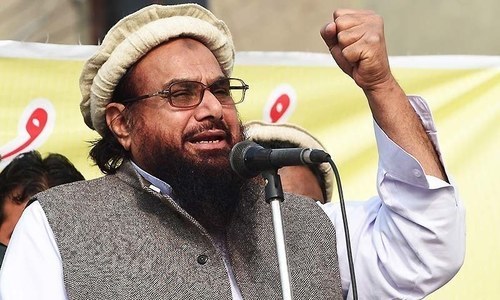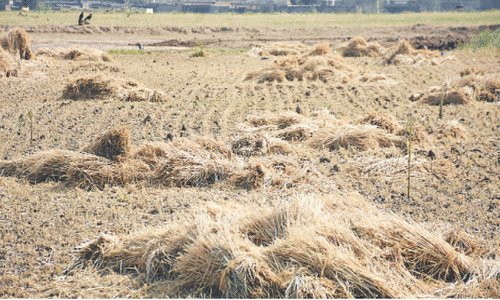WASHINGTON: The United States urged Pakistan on Friday to re-arrest Lashkar-e-Taiba (LeT) leader Hafiz Saeed and charge him with the crimes he is accused of committing.
Mr Saeed, who has been designated a terrorist by the US Justice Department, was released early on Friday after a court on Wednesday rejected the government’s plea for a 60-day extension in his house arrest.
“The Pakistani government should make sure that he is arrested and charged for his crimes,” said the State Department in a statement issued hours after Mr Saeed’s release.
It is rare for the US government to issue a statement during the Thanksgiving holidays but the State Department felt that the issue was urgent enough to ignore this tradition.
“The United States is deeply concerned that Lashkar-e-Taiba leader Hafiz Saeed has been released from house arrest in Pakistan,” the department said, adding that “LeT is a designated Foreign Terrorist Organisation responsible for the death of hundreds of innocent civilians in terrorist attacks, including a number of American citizens”.
The US Treasury Department branded the LeT chief a Specially Designated Global Terrorist in May 2008 and in December 2008 the United Nations also designated him a “terrorist individual”. Both designations blamed him for the November 2008 Mumbai attack in which 166 people, including six American citizens, were killed.
Jamaatud Dawa chief accuses India of fuelling terrorism in Pakistan
The State Department reminded Pakistan that LeT and several of its front organisations, leaders and operatives remained under State Department and Treasury Department sanctions.
Since 2012, the United States has offered a $10 million reward for information that brings Mr Saeed to justice.
In an earlier statement to the Indian media, Bruce Riedel, who headed the team that formulated the Obama administration’s Afghan policy, urged Washington to take strong action against Pakistan for releasing Mr Saeed. “Nine years after 26/11, its mastermind still eludes justice. It is time to rescind Pakistan’s status as a major non-Nato ally,” he said.
Pakistan rejects India’s ‘self-serving insinuations’
In response to a question regarding comments made by the Indian Ministry of External Affairs on the release of Hafiz Saeed, the Foreign Office spokesperson said that Pakistan remains committed to the implementation of UNSC 1267 sanctions regime and has taken several steps in this regard.
The spokesperson took exception to self-serving insinuations.
The courts in Pakistan, pursuant to their constitutional duty, are determined to uphold rule of law and due process for all citizens of Pakistan. Legal processes are anchored in rule of law, not dictates of politics and posturing.
It is in the interest of all states to speak and act in a manner that is consistent with the imperatives of adhering to rule of law at the national and international levels.
Pakistan’s resolve, actions and successes in the fight against terrorism, terrorist violence and terrorists is unmatched in the world. Pakistan condemns and opposes all forms of terrorism by any individual or group. Pakistan also opposes and condemns acts of terrorism inside Pakistan and elsewhere by India, which claims to be a champion of democracy, and international law, according to the spokesperson.
Our Staff Reporter in Lahore adds: Only a few hours after being released, Mr Saeed accused India of funding and fuelling terrorism and extremism in Pakistan. He said evidence was available to substantiate this.
The Jamaatud Dawa chief was delivering the Friday sermon at Masjid-i-Qadsia. “Peace cannot be restored and maintained in Pakistan until notorious elements such as Kulbhushan [Jadhav] are present in the country,” he said.
Terming Pakistan a gift from Allah, Mr Saeed said: “Today’s biggest problem is that Pakistani rulers are obeying the West like slaves. We have to free Pakistan. Freedom of Pakistan in real terms can ensure Kashmir’s independence.” He claimed that he was fighting the case for a free Pakistan and a free Kashmir. There was nothing personal about the affair.
“The day when the rulers will start taking their own decisions, foreign pressure will evaporate,” he said.
Mr Saeed urged the government to re-evaluate its priorities and reformulate its policies about India.
Pakistan should open a dialogue with India only after it pulls out its armed forces from occupied Kashmir.
“Former prime minister Nawaz Sharif was ousted from his office because he betrayed the Kashmiris,” he said.
The parliamentarians took the oath that they would protect Pakistan and Kashmir, he said and added that any deviation from it would have consequences.
Published in Dawn, November 25th, 2017















































